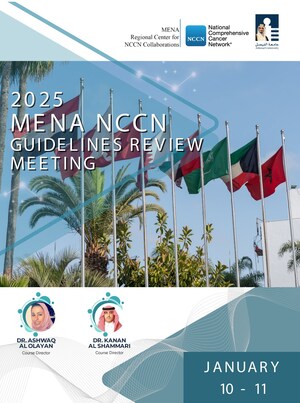JNCCN: Many Hospitalized People with Advanced Cancer Struggle with Important Daily Tasks
Researchers at Mass General Cancer Center discover 40.2% of advanced cancer patients with unplanned hospitalizations experienced functional impairment, which correlated with longer hospital stays and worse outcomes.
PLYMOUTH MEETING, Pa., June 8, 2020 /PRNewswire/ -- New research from Mass General Cancer Center, published in the June 2020 issue of JNCCN—Journal of the National Comprehensive Cancer Network, found 40.2% of hospitalized patients with advanced, incurable cancer were functionally impaired at the time of admission, meaning they needed assistance with activities of daily living (ADLs) like walking, bathing, getting dressed, or other routine tasks. Patients with functional impairment also had higher rates of pain, depression, and anxiety, and were more likely to have longer hospital stays and worse survival.
"Interventions addressing patients' functional impairment and symptom management could help enhance care delivery and outcomes for the highly symptomatic population of hospitalized patients with advanced cancer," said lead researcher Daniel E. Lage, MD, MsC, Mass General Cancer Center. "This highlights the need for efforts to integrate functional assessments into the care of these patients to identify individuals who may benefit from physical therapy, palliative care, and/or other supportive services earlier in their hospital stay. Our finding that individuals with functional impairment experience worse survival could also help guide conversations about goals of care and hospice planning among hospitalized patients with cancer."
"We are also actively exploring interventions to help patients transition from the inpatient to the outpatient setting, which we have identified as a key challenge for patients with functional impairment," added senior researcher Ryan D. Nipp, MD, MPH, Mass General Cancer Center. "Future work is needed to develop novel models of care to enhance access to palliative care services and address barriers that limit appropriate access to palliative care among patients with advanced cancer."
The researchers studied 970 patients age 18-and-older with advanced cancer—defined as those not being treated with curative intent—who experienced an unplanned hospital admission at Mass General Cancer Center between September 2, 2014 and March 31, 2016. They measured functional impairment using nursing documentation collected at intake and stored in electronic health records (EHR), and also collected self-completed questionnaires from the patients. ADL impairment was defined as any need for assistance by another person. Overall, 390 patients (40.2%) had at least one ADL impairment with 14.8% having one or two, and 25.4% experiencing at least three areas of difficulty with daily tasks.
"Oncologists have long appreciated that functional status is a powerful predictor of a number of important outcomes including survival and treatment outcomes," commented Toby Campbell, MD, Chief of Palliative Care at the University of Wisconsin Carbone Cancer Center, who was not involved in this research. "We know that the routine assessment of symptom burden and functional status in the outpatient setting results in improved survival and quality of life."
Dr. Campbell, a Member of the NCCN Guidelines® Panel for Palliative Care, continued: "Dr. Lage and colleagues highlight the important, often-missed, opportunity to routinely use hospitalization as a trigger for a careful assessment of symptoms and functional status. An unplanned hospitalization for an advanced cancer patient is a watershed moment and predicts higher symptoms and shorter survival in patients with and without impaired function. Hospitalization is a crucial opportunity to facilitate critical serious illness care, including comprehensive palliative care and advanced care planning, with the promise of improving the lives of our patients."
To read the entire study, visit JNCCN.org. Complimentary access to "Functional Impairment, Symptom Burden, and Clinical Outcomes Among Hospitalized Patients With Advanced Cancer" is available until September 10, 2020.
About JNCCN—Journal of the National Comprehensive Cancer Network
More than 25,000 oncologists and other cancer care professionals across the United States read JNCCN—Journal of the National Comprehensive Cancer Network. This peer-reviewed, indexed medical journal provides the latest information about innovation in translational medicine, and scientific studies related to oncology health services research, including quality care and value, bioethics, comparative and cost effectiveness, public policy, and interventional research on supportive care and survivorship. JNCCN features updates on the NCCN Clinical Practice Guidelines in Oncology (NCCN Guidelines®), review articles elaborating on guidelines recommendations, health services research, and case reports highlighting molecular insights in patient care. JNCCN is published by Harborside. Visit JNCCN.org. To inquire if you are eligible for a FREE subscription to JNCCN, visit http://www.nccn.org/jnccn/subscribe.aspx. Follow JNCCN on Twitter @JNCCN.
About the National Comprehensive Cancer Network
The National Comprehensive Cancer Network® (NCCN®) is a not-for-profit alliance of leading cancer centers devoted to patient care, research, and education. NCCN is dedicated to improving and facilitating quality, effective, efficient, and accessible cancer care so patients can live better lives. The NCCN Clinical Practice Guidelines in Oncology (NCCN Guidelines®) provide transparent, evidence-based, expert consensus recommendations for cancer treatment, prevention, and supportive services; they are the recognized standard for clinical direction and policy in cancer management and the most thorough and frequently-updated clinical practice guidelines available in any area of medicine. The NCCN Guidelines for Patients® provide expert cancer treatment information to inform and empower patients and caregivers, through support from the NCCN Foundation®. NCCN also advances continuing education, global initiatives, policy, and research collaboration and publication in oncology. Visit NCCN.org for more information and follow NCCN on Facebook @NCCNorg, Instagram @NCCNorg and Twitter @NCCN.
Media Contact:
Rachel Darwin
267-622-6624
[email protected]
SOURCE National Comprehensive Cancer Network

Related Links
WANT YOUR COMPANY'S NEWS FEATURED ON PRNEWSWIRE.COM?
Newsrooms &
Influencers
Digital Media
Outlets
Journalists
Opted In






Share this article